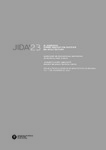Diseño de escenarios de aprendizaje universitarios para aprender haciendo

Use este enlace para citar
http://hdl.handle.net/2183/36693
A non ser que se indique outra cousa, a licenza do ítem descríbese como Atribución-NoComercial-SinDerivadas 3.0 España
Coleccións
- Investigacion (ETSAC) [511]
Metadatos
Mostrar o rexistro completo do ítemTítulo
Diseño de escenarios de aprendizaje universitarios para aprender haciendoTítulo(s) alternativo(s)
University learning scenarios design for learning-by-doingAutor(es)
Data
2023-11Cita bibliográfica
Prado-Acebo, Cristina. 2023. Diseño de escenarios de aprendizaje universitarios para aprender haciendo. JIDA, 23, 146-164
Resumo
[Resumen] La educación es un tema de interés mundial, incluyendo los espacios donde se
desarrolla. Se habla de un cambio en la educación, pero no del espacio necesario
para estas nuevas metodologías activas. Bajo el paraguas del filósofo y pedagogo
Dewey, siguiendo su máxima de aprender haciendo, se realiza un recorrido histórico
por los escenarios de aprendizaje en el nivel universitario y se estudian los factores
a tener en cuenta en su diseño, observando la necesidad de un cambio en los
escenarios de aprendizaje, especialmente en la escala del diseño interior y
mobiliario, que deben adaptarse a la metodología, actividades a desarrollar y a los
usuarios. Dentro del cambio del aula escena al ambiente escenario, se deconstruye
el aula y sus principales elementos más característicos, analizando el paso del
pupitre mueble al prototipo móvil, de la pizarra y del estrado a la interfaz interactiva,
y de la puerta a la apertura. [Abstract] Education is a global issue, including the spaces where it takes place. There is
discussion regarding a change in education, but not about the space necessary for
these new active methodologies. In the framework of the philosopher and
pedagogue Dewey, following his principle of learning by doing, a historical review of
learning scenarios at university level is carried out and the factors to be taken into
account in their design are studied, observing the need for a change in learning
scenarios, especially in the scale of interior design and furniture, which must be
adapted to the methodology, activities to be developed and users. Within the change
from the classroom scene to the scenario environment, the classroom and its main
characteristic elements are deconstructed, analysing the transition from the fixed
desk to the mobile prototype, from the blackboard and the platform to the interactive
interface, and from the door to the opening.
Palabras chave
Escenarios de aprendizaje
Diseño
Espacios educativos
Universidad
Aprender haciendo
Learning scenarios
Design
Educational spaces
University
Learning by doing
Diseño
Espacios educativos
Universidad
Aprender haciendo
Learning scenarios
Design
Educational spaces
University
Learning by doing
Versión do editor
Dereitos
Atribución-NoComercial-SinDerivadas 3.0 España
ISSN
2462-571X






